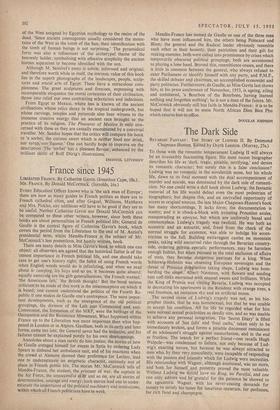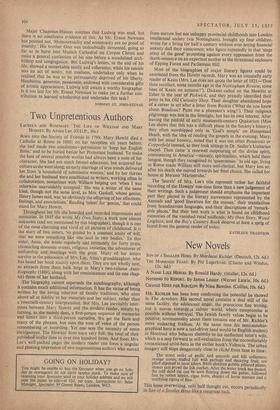The Dark Side
BAVARIAN FANTASY: THE STORY OF LUDWIG II. By Desmond Chapman-Huston. Edited by Osyth Leeston. (Murray, 25s.)
To those with the romantic temperament Ludwig II will always be an irresistibly fascinating figure. His most recent biographer describes his life as 'dark, tragic, pitiable, terrifying,' and denies its romantic character; but surely this is a false conclusion? Ludwig was no romantic in the novelettish sense, but his whole life, down to its final moment with the dual accompaniment of murder and suicide, was dominated by the dark side of romanti- cism. No one could write a dull book about Ludwig; the fantastic material of his life would defeat even the most pedestrian of biographers; but despite this, and an unrivalled opportunity of access to original sources, the late Major Chapman-Huston's book has many shortcomings. It lacks form; the documentation is scanty; and it is chock-a-block with irritating Proustian asides, masquerading as apercus, but which are uniformly banal and commonplace. Ludwig's tragedy was twofold. He was both an eccentric and an autocrat, and, freed from the check of the normal struggle for existence, was able to indulge his eccen- tricities to the full. Building extravagant castles on mountain peaks, taking wild nocturnal rides through the Bavarian country- side, ordering private operatic performances, may be harmless enough foibles, but when pursued to the total exclusion of affairs of state, they become dangerous pastimes for a king. When Schleswig-Holstein was obsessing European sovereigns and the threat of Prussian domination taking shape, Ludwig was bom- barding the singer, Albert Niemann, with flowers and sending him cuff-links encrusted with enamel swans and brilliants. While the King of Prussia was visiting Bavaria, Ludwig was occupied in decorating his apartments in the Residenz with orange trees, a real fountain, an imitation sky and an artificial moon.
The second cause of Ludwig's tragedy was not, as his bio- grapher thinks, that he was homosexual, but that he was unable to accept his condition. All his life he regarded what for him were normal sexual proclivities as deadly sins, and so was Unable to achieve any personal integration. The 'Secret Diary' is filled with accounts of 'last falls' and 'final oaths,' taken only to be immediately broken, and forms a pitiable document reminiscent of an adolescent's struggle against masturbation, and in the end as fruitless. The search for a perfect friend—one recalls Hugh Walpole—was condemned to failure, not only because of Lud- wig's exacting nature, but because he was always attracted to men who, by their very masculinity, were incapable of responding with the passion and intensity which for Ludwig were necessities. His relationship with Wagner, although emotional, was no more, and both for himself and posterity proved the most valuable. Without Ludwig we would have no Ring, no Parsifal, and one can only admire and be grateful for the patience he showed to the egocentric Wagner, with his never-ceasing demands for money to satisfy his tastes for luxurious materials, for perfumes, for rich food and champagne.
Major Chapman-Huston assumes that Ludwig was mad, but there is no conclusive evidence of this. As Mr. Ernest Newman has pointed out, 'Homosexuality and eccentricity are no proof of insanity.' His brother Otto was undoubtedly demented, going so far as to burst into Munich Cathedral on Corpus Christi and make a general confession of his sins before a scandalised arch- bishop and congregation. But Ludwig's letters, to the end of his life, showed a remarkable sanity and coherence; while his suicide was an act of sanity, not madness, undertaken only when he realised that he was to be permanently deprived of his liberty. Handsome, generous, passionate, endowed with considerable gifts of artistic appreciation, Ludwig still awaits a worthy biographer. Is it too late for Mr. Ernest Newman to make yet a further con- tribution to learned scholarship and undertake this task?
NORMAN ST. JOHN-STEVAS



































 Previous page
Previous page